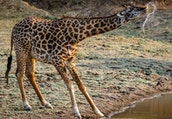- 1. Africa Jackal Species: There are three species of jackals found in Africa: the Black-backed Jackal (Canis mesomelas), the Side-striped Jackal (Canis adustus), and the Golden Jackal (Canis aureus). The Black-backed Jackal is the most widespread and commonly encountered species.
- 2. Africa Jackal Appearance: Jackals are medium-sized canines with a fox-like appearance. They have slender bodies, long legs, and pointed ears. The Black-backed Jackal has a mostly tan or golden coat with a black saddle-like patch along its back, while the Side-striped Jackal has a stripe running down its side, and the Golden Jackal has a more golden or sandy coat.
- 3. Africa Jackal Size: Adult jackals stand about 15 to 20 inches (38 to 50 centimeters) tall at the shoulder and can weigh between 15 to 35 pounds (7 to 16 kilograms).
- 4. Africa Jackal Habitat: Jackals are highly adaptable and can be found in a variety of habitats, including savannas, grasslands, woodlands, deserts, and even urban areas. They are opportunistic predators and scavengers, able to thrive in various environments.
- 5. Africa Jackal Diet: Jackals are omnivorous and have a varied diet. They primarily feed on small mammals, birds, insects, and reptiles. They are also known to scavenge on carrion and will eat fruits and plant matter when animal prey is scarce.
- 6. Africa Jackal Conservation Status: The conservation status of jackal species varies. The Black-backed Jackal is classified as "Least Concern" by the International Union for Conservation of Nature (IUCN), while the Side-striped Jackal is listed as "Least Concern," and the Golden Jackal's status varies depending on its geographical location.
- 7. Africa Jackal Behavior: Jackals are generally solitary or found in monogamous pairs. They are primarily nocturnal animals, being more active during the night and early morning hours. Jackals are vocal animals and use various calls to communicate with one another.
- 8. Africa Jackal Predators: Jackals are prey to larger predators such as lions, hyenas, leopards, and African wild dogs. Their elusive and cautious behavior helps them avoid becoming prey.
Africa Jackal:
The jackal is a carnivorous mammal native to various regions of Africa.
Africa Safari Tour Book online The Jackal safari
Here is some information about the jackal:
Africa Jackal Safari
An Africa jackal safari offers an exciting opportunity to observe these elusive and adaptable canines in their natural habitat. Jackals are intriguing and adaptive animals, and observing them in the wild can provide valuable insights into their behavior and their role in the African ecosystem.
Here are some key points to consider when planning a safari with a focus on observing jackals:
Africa Jackals Safari Destinations
Safari Destinations: Jackals can be found in various regions of Africa, making them a common sighting on safaris in many countries. Some popular safari destinations to observe jackals include:
- South Africa: Kruger National Park, Kgalagadi Transfrontier Park, Pilanesberg National Park.
- Namibia: Etosha National Park, Skeleton Coast National Park, Namib-Naukluft National Park.
- Botswana: Chobe National Park, Moremi Game Reserve, Okavango Delta.
- Tanzania: Serengeti National Park, Ngorongoro Crater, Selous Game Reserve.
- Kenya: Maasai Mara National Reserve, Amboseli National Park.
Africa Jackal Safari Game Drives:
Participate in game drives, which are guided tours in open vehicles, to explore the national parks and reserves where jackals are commonly found. Game drives offer excellent opportunities for wildlife viewing, including jackals and other African wildlife.
Africa Jackal Guided Walking Safaris:
Consider participating in guided walking safaris to get up close to jackals and experience the African bush on foot. Walking safaris provide a more intimate and immersive experience with the wildlife and their natural environment.
Africa Jackal Nocturnal Game Drives:
Jackals are primarily nocturnal animals, and some safari operators offer special nocturnal game drives to observe them during their most active periods at night.
Africa Jackal Accommodations:
Choose accommodations located within or near the national parks and reserves, allowing for easy access to jackal-rich areas. Many lodges and camps offer guided game drives and walking safaris as part of their safari packages.
Africa Jackal Accommodations
Choose accommodations located near the water bodies where hippos are commonly found. Many lodges and camps offer opportunities for boat safaris or have waterholes frequented by hippos.
Africa Jackal Photography Opportunities
Bring a good camera with a zoom lens to capture jackals and other wildlife in their natural habitats. A pair of binoculars will also be helpful for better wildlife viewing.
Africa Jackal Wildlife Diversity:
While on your jackal safari, you'll likely encounter a diverse range of African wildlife, including other predators, antelope species, elephants, giraffes, and various birdlife.
Africa Jackal Conservation and Responsible Tourism:
Practice responsible wildlife viewing by following park regulations and respecting the natural behavior of jackals and other animals. Support conservation efforts that aim to protect the habitats and populations of these fascinating canines.








 |
|  |
|  |
|  |
| 